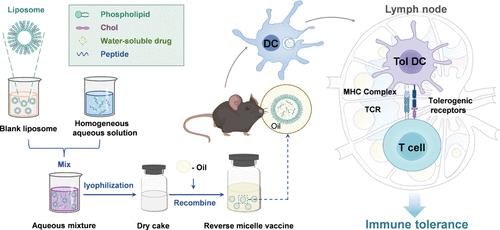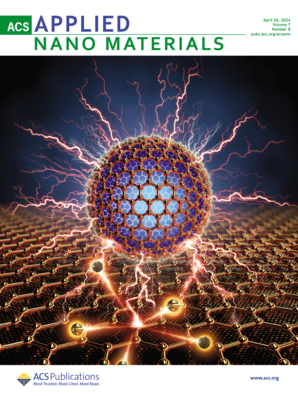Tolerogenic Reverse Micelle Nanovaccine Prevents Onset and Progression of Multiple Sclerosis
IF 5.3
2区 材料科学
Q2 MATERIALS SCIENCE, MULTIDISCIPLINARY
引用次数: 0
Abstract
Exhilarating breakthroughs in the treatment of autoimmune diseases through antigen-specific therapies offer new hope for patients. Herein, a novel antigen-specific reverse micelle platform is proposed: blank liposomes prepared with 1, 2-diolyl-sn-glycerol-3-phosphocholine (DOPC) and cholesterol (Chol) are mixed with an aqueous solution of the encapsulated antigens and immunomodulators, lyophilized, and then reconstituted in oil. Subcutaneous injection of 100 μL of a reverse micelle vaccine loaded with 10 μg of MOG35–55 and 30 μg of dexamethasone sodium phosphate (DSP) before experimental autoimmune encephalomyelitis (EAE, a multiple sclerosis model) establishment directly blocked the development of clinical symptoms. Furthermore, the same vaccine delayed and attenuated clinical symptoms in an established mouse model of EAE. Conversely, the reverse micelle vaccine loaded with an unrelated antigen OVA failed to alleviate paralysis in mice, highlighting the crucial aspect of antigen specificity. Dose-dependent effects were observed in both the prevention and treatment of EAE, with clinical scores of 0 being achieved during the treatment at single DSP doses of up to 50 μg at the MOG35–55 dose of 10 μg. The treatment of the reverse micelle vaccine induced Treg cell proliferation, accounting for the tolerance to the pathogenic antigens and improved outcomes. Overall, the designed reverse micelle vaccine provided a universal platform to encapsulate antigens and immunomodulators that restore tolerance of antigens and then demonstrated the therapeutic promise in autoimmune diseases.

耐受性反向微粒纳米疫苗可预防多发性硬化症的发病和进展
通过抗原特异性疗法治疗自身免疫性疾病取得了令人振奋的突破,为患者带来了新的希望。本文提出了一种新型抗原特异性反向胶束平台:将用 1,2-二氧代-sn-甘油-3-磷酸胆碱(DOPC)和胆固醇(Chol)制备的空白脂质体与封装抗原和免疫调节剂的水溶液混合、冻干,然后在油中重组。在建立实验性自身免疫性脑脊髓炎(EAE,一种多发性硬化症模型)之前,皮下注射 100 μL 含有 10 μg MOG35-55 和 30 μg 地塞米松磷酸钠(DSP)的反向胶束疫苗,可直接阻止临床症状的发展。此外,在已建立的小鼠 EAE 模型中,同一种疫苗可延缓并减轻临床症状。相反,含有不相关抗原 OVA 的反向胶束疫苗却不能减轻小鼠的麻痹症状,这突出表明了抗原特异性的重要性。在预防和治疗 EAE 的过程中观察到了剂量依赖性效应,单次 DSP 剂量高达 50 μg,MOG35-55 剂量为 10 μg,治疗期间临床评分为 0。反向胶束疫苗的治疗诱导了Treg细胞增殖,这是对致病抗原产生耐受并改善疗效的原因。总之,所设计的反向胶束疫苗提供了一个封装抗原和免疫调节剂的通用平台,可恢复对抗原的耐受性,进而显示出对自身免疫性疾病的治疗前景。
本文章由计算机程序翻译,如有差异,请以英文原文为准。
求助全文
约1分钟内获得全文
求助全文
来源期刊

ACS Applied Nano Materials
Multiple-
CiteScore
8.30
自引率
3.40%
发文量
1601
期刊介绍:
ACS Applied Nano Materials is an interdisciplinary journal publishing original research covering all aspects of engineering, chemistry, physics and biology relevant to applications of nanomaterials. The journal is devoted to reports of new and original experimental and theoretical research of an applied nature that integrate knowledge in the areas of materials, engineering, physics, bioscience, and chemistry into important applications of nanomaterials.
 求助内容:
求助内容: 应助结果提醒方式:
应助结果提醒方式:


